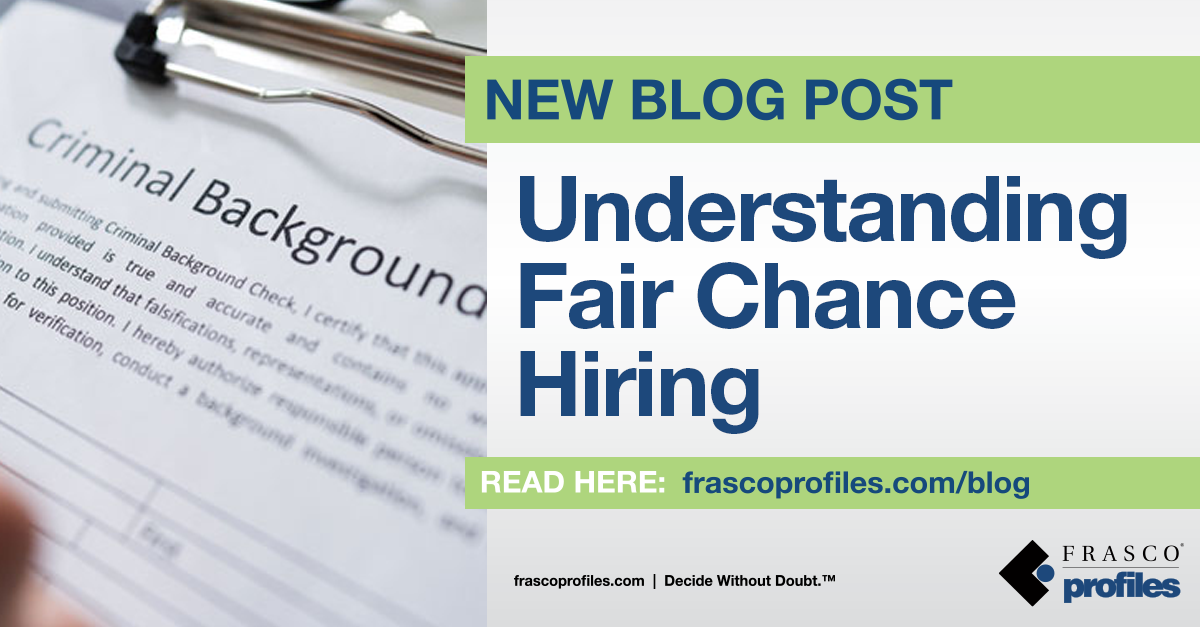Did you know that nearly 70 million Americans have a criminal record, as stated by CNN, in April 2021?
Recently, Walmart, Inc. has made headlines, as the retail conglomerate faces a nationwide class action lawsuit claiming discrimination against African Americans and Hispanics, via a strict background check policy that fails to consider rehabilitation and other mitigating circumstances, states Reuters. The complaint Ramos v. Walmart Inc. (No. 2:21-cv-13827) filed in July 2021, asserted that the company’s background check policy violated state and federal law.
Criminal records follow a person for the rest of their lives, long after they have paid their debt to society. Formerly incarcerated Americans need stability and long-term employment to support themselves and their families financially. They must feel that they are positively contributing to their communities, and thereby keeping from re-entering the prison system. Fair Chance Hiring must be considered within your organization.
The above-mentioned complaint claimed that Walmart, Inc.’s policy of denying jobs to ex-offenders who have prior criminal records, regardless of how much time had passed or the steps taken to rehabilitate, had a disparate impact on job applicants of color, who are far more likely to have criminal convictions than white job applicants.
Having a criminal record often presents employment challenges, ruling many candidates out of contention, even if they’re qualified. So, what is Fair Chance Hiring exactly? It’s exactly as its’ name suggests – the proposition that all applicants, regardless of their criminal background, have the right to be reasonably evaluated for a job opportunity they are trained for. Employers that practice this, gain greater access to a larger pool of diverse and suitable workers, and in turn, may experience better business outcomes.
When evaluating your Fair Chance Hiring program, answer these questions:
Is our workplace diverse and inclusive?
Inclusivity does not end at race, gender, or sexual orientation. It also involves criminal records. In America, African Americans and Hispanics make up approximately 32% of the population but make up 52% of the total people incarcerated, according to the NAACP. Refusing to hire those with a criminal record, inadvertently, contributes to a less diverse workplace. A culture that supports and normalizes Fair Chance Hiring is vital to diversity and inclusion initiatives. It should be factored into your company’s mission and values. Be willing to learn and evolve by breaking down employment barriers for previously incarcerated individuals and making your hiring processes fair for all.
Do we have a competitive advantage?
Statista reported that the unemployment rate, as of July 2021, dropped to 5.4%. This indicates that it is a candidates’ market, allowing them to interview at numerous companies and consider multiple offers before making employment decisions. As a result, the hiring process is prolonged, and employers cannot fulfill roles as quickly as they would like. Fair Chance Hiring eliminates the wait time by extending the eager talent pool.
Do we want a better return-on-investment?
From a performance and retention standpoint, Fair Chance Hiring offers a significant ROI. The findings of a 2018 SHRM survey reveal that 80% of employees with criminal records bring more value to their organizations than others. Due to the difficulty of securing employment, you are likely to retain the worker with a criminal background for a longer period of time.
When managing Fair Chance Hiring in your company’s hiring process, it is important to remember that a criminal record does not define the candidate. Emphasize that you see them for who they are in the present and that they are qualified, prepared, and have the resources needed to be successful in the role. Of course, there are limitations to the types of crimes committed that may immediately disqualify a candidate. If an applicant is outside of those limitations, they should be given a fair chance.
Working with sourcing partners increases the probability of connecting with high-quality candidates. There are several throughout the US, who work directly with those that have a criminal record and help to prepare them for hiring through job readiness programs. This training allows for accelerated learning required to be successful in the workplace. It also gets the candidates primed for mentorship that cultivates better performance and retention. By adopting Fair Chance Hiring, millions of Americans have the opportunity of having financial stability, a career and purpose.
If you have any questions about the content of this post or our services, please contact Customer Service at info@frasco.com. The material in this post is for informational purposes only and is not to be construed as legal advice. We urge you to consult with your legal counsel to obtain legal opinion specific to your needs.





